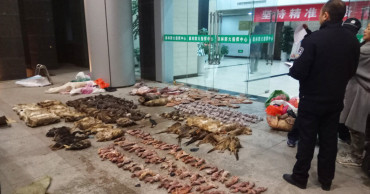wild animals
74 wild animals rescued from Swapnopuri Park in Dinajpur
The Forest Department's Wildlife Crime Control Unit and the Social Forestry Division of Dinajpur rescued 74 wild animals from Swapnopuri Park and Mini Zoo in Nawabganj upazila of Dinajpur on Friday.
The rescued animals include Hoolock Gibbons, Asiatic Black Bears, Capped Langurs, Greater Hornbills, Slow Lorises, otters and various species of snakes and turtles. Some of the animals were found injured during the raid.
Officials revealed that the animals were being illegally confined and displayed at the park without any valid permits. The park manager was interrogated, and legal actions are being prepared based on the findings of the investigation.
“We will take all necessary steps to rehabilitate the rescued animals and ensure their proper care,” an official said, adding that stricter measures will be enforced to curb wildlife trafficking and illegal confinement.
1,200 trapped birds rescued, freed in Bagerhat
The operation was conducted under the leadership of Wildlife Inspectors Abdullah As Sadiq and Asim Mallik, with overall supervision from Sanaullah Patwary, director of the Wildlife Crime Control Unit.
Nurunnahar, assistant conservator of forests and other officials from the Social Forestry Division participated in the operation, while law enforcement personnel from Nawabganj Police Station provided support.
1 year ago
Sundarbans reopens to tourists, fishermen after 3 months
The authorities have reopened the Sundarbans for tourists, fishermen and wood collectors after a three-month closure.
The closure was enforced to ensure safe breeding of many wild animals.
On the first day of reopening, 75 tourists were allowed to enter the world’s largest mangrove forest by ship ‘The Web’ around 12 am to experience tranquility and beauty of the forest, Majharul Haque, joint general secretary of Sundarbans Tour Operators.
Read:Expectations abound as tourists set to return to Sundarbans from Sept 1
Another ship with 40 artistes entered the Sundarbans Thursday morning.
Six more ships with 250 visitors are set to enter the forest on Friday, said an official of the Forest Department.
Earlier, the Forest Department imposed the three-month ban on tourists from June 1 to August 31 in the Sundarbans, to coincide with what is the peak breeding season for most animals in the forest.
The entrance of visitors from home and abroad, fishermen, wood and honey collectors remained restricted during this ban period. Moreover, no boats and ships were allowed to move in the rivers.
Some wood collectors (Bawal) and honey collectors (Mowal) entered the Sundarbans on Thursday after taking pass from the Forest Department.
Read: Padma Bridge to bring good luck for the Sundarbans tourism
Tour operator, launch and boat owners have taken adequate measures to attract more tourists, said Mazharul Haque.
HM Dulal, a tour operator of the Sundarbans, expected that a large number of tourists will visit Sundarbans due to better communication system as people can easily travel to the forest by crossing the Padma Bridge.
3 years ago
Environmental organizations protest dysfunction of rules to protect forest-wild animals
Environmental organizations have protested the dysfunctional role of the Forest Department to stop the killing of wild animals in Bangladesh.
Environment workers and their 33 organizations have submitted 8-point to the government for proper implementation of wild animals including elephants by the smuggling group.
They placed the demands from a sit-in program held in front of the Bon Bhaban (office of the Forest Department) at Agargaon in Dhaka on Sunday.
Read: Another Asian elephant found dead, this time in Chakaria reserved forest
A total of 33 environmental organizations took part in the protest program under the Bangladesh Nature Conservation Alliance (BNCA) platform.
The united platform launched the protest for failure of the authorities concerned as well as the Forest Department to stop deforestation and killing of wild animals.
Read: Elephant carcass found along Sherpur border
Prof Dr Kamruzzaman Majumder, convener of the BNCA and joint secretary of Bangladesh Paribesh Andolan (BAPA), presided over the program.
4 years ago
Environment, health at risk for wildlife crime: UN report
Wildlife crime like selling of wild animals in open markets is a threat to both environment and human health as it can increase the transmission of diseases that spread from animals to humans.
The findings were revealed in ‘World Wildlife Crime Report 2020’, produced by the UN Office on Drugs and Crime (UNODC), reports UN News.
The report disclosed that zoonotic diseases represent up to 75 percent of all emerging infectious diseases and include the new coronavirus that caused the global pandemic.
Ghada Waly, executive director, UNODC, said “Transnational organized crime networks are reaping the profits of wildlife crime, but it is the poor who are paying the price.”
Most trafficked mammal Pangolins
The report highlights the trafficking of wild species such as pangolins, which has been identified as a potential source of coronaviruses.
Experts from the World Health Organization (WHO) are on their way to China, in efforts to determine the animal source of COVID-19.
Seizures of pangolin scales increased tenfold between 2014 and 2018, making them most trafficked wild mammals in the world.
In the last decade, about 6,000 species were seized, which include mammals but also reptiles, corals, birds and fish.
No single country was identified as the source of more than 9 percent of the total number of seized shipments, while suspected traffickers represented roughly 150 nationalities, underscoring the global nature of these crimes.
Illegal tropical wood on the rise
The UNODC report also analyzed the markets for illicit rosewood, ivory, rhino horn, pangolin scales, live reptiles, big cats and the European eel.
According to the report, trends show demand for African ivory and rhino horn is in decline, indicating that the market for them is smaller than previously suggested.
It is estimated that these two items generated more than $600 million annually between 2016 and 2018, it said.
Meanwhile, demand for tropical hardwood timber has risen significantly over the past two decades. Illegal African rosewood has even entered legitimate supply chains for the furniture trade.
At the same time, seizures of tiger products have also been on the rise, alongside traffickers’ interest in other big cat parts that can serve as substitutes.
Wildlife trade has also gone digital, with traffickers selling live reptiles and tiger bone products, among other products, through online platforms and encrypted messaging apps.
Critical cross-border coordination
UNODC believes stopping wildlife crime is critical to protecting biodiversity and the rule of law, but also for preventing future public health emergencies.
The report underscored the need for stronger criminal justice systems and improved international cooperation and cross-border investigations, among other measures.
Ms Waly, the UN agency’s chief, said “To protect people and planet in line with the Sustainable Development Goals, and to build back better from the COVID-19 crisis, we cannot afford to ignore wildlife crime.”
She also said that “The 2020 World Wildlife Crime Report can help to keep this threat high on the international agenda and increase support for governments to adopt the necessary legislation, and develop the inter-agency coordination and capacities needed to tackle wildlife crime offences.”
5 years ago
Virus renews safety concerns about slaughtering wild animals
China cracked down on the sale of exotic species after an outbreak of a new virus in 2002 was linked to markets selling live animals. The germ turned out to be a coronavirus that caused SARS.
6 years ago
Virus renews safety concerns about slaughtering wild animals
China cracked down on the sale of exotic species after an outbreak of a new virus in 2002 was linked to markets selling live animals. The germ turned out to be a coronavirus that caused SARS.
6 years ago

.jpg)

.jpg)




